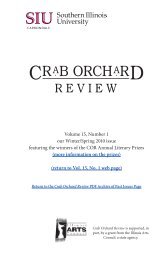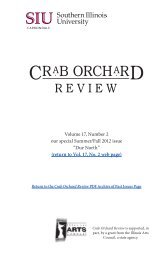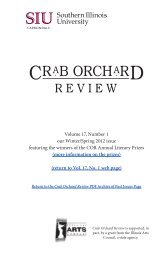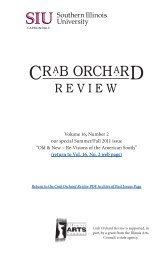Crab Orchard Review Vol. 12, No. 2, our
Crab Orchard Review Vol. 12, No. 2, our
Crab Orchard Review Vol. 12, No. 2, our
You also want an ePaper? Increase the reach of your titles
YUMPU automatically turns print PDFs into web optimized ePapers that Google loves.
Book <strong>Review</strong>s<br />
lesbian confused by her romantic feelings for Leo, share not only a<br />
friendship, but also “a long history of beating the shit out of people.”<br />
In one of the collection’s strongest stories, “<strong>No</strong>t People, <strong>No</strong>t This,”<br />
two more main characters share a proclivity for hitting. Trooper, a barowner<br />
in Opelika, Alabama, and Ames, a high school drop-out who had<br />
been Trooper’s neighbor when they were children, “both dealt with fear<br />
the same way: they hit,” although Trooper had learned to control this<br />
reaction after marrying and having a child, while Ames “couldn’t keep<br />
his hands out of trouble.” In the story, an omniscient plural narrator,<br />
perhaps the collective consciousness of the town itself, describes the<br />
events on the day a tornado touched down and a woman disappeared—<br />
an event in which Ames may or may not have been involved. The story<br />
is told as a set of converging narratives, with seemingly unrelated<br />
characters introduced in separated sections only to come together later.<br />
In this particular story, that structure is effective, as the speculative<br />
look at the ways in which the narratives may have converged allows for<br />
an exploration of the possibilities of human behavior and the idea that<br />
people are “more willing to believe the impossible than the tragic.”<br />
Magee uses a converging narrative structure in two other stories,<br />
but with less success. “Vertical Mile” begins with great promise as three<br />
narratives are introduced. First is the story of Marcus, an obese gay<br />
man who despairs that he can never be loved as anything other than<br />
a fetish and who consequently embarks on a mission to kill himself via<br />
an arduous trek down the Grand Canyon’s Bright Angel Path, without<br />
any gear and with a body in no shape to make the climb. Next we meet<br />
Ella, a fit, seventy-two-year-old widow who is hiking the same path<br />
as Marcus in a kind of homage to her recently deceased friend, for<br />
whom she harbors romantic feelings, although both women have lived<br />
as heterosexuals all their lives. And finally we meet the AZK crew, a<br />
gang of teenagers that hikes into the canyon at night in order to paint<br />
elaborate graffiti on its walls.<br />
And while each of these narratives is introduced with great care and<br />
well-paced exposition, their convergence and the subsequent events feel<br />
rushed and the ending abortive, a disappointment given the richness of<br />
the story’s beginning components. Similarly, “Straitjacket” introduces<br />
multiple potentially interesting characters, but their convergence feels<br />
jumbled and relies on too many convenient coincidences to make for an<br />
effectively convincing story.<br />
Magee is most successful in the linear stories in which she portrays<br />
empathetically a variety of inner struggles that people go through in<br />
<strong>Crab</strong> <strong>Orchard</strong> <strong>Review</strong> ◆ 219






